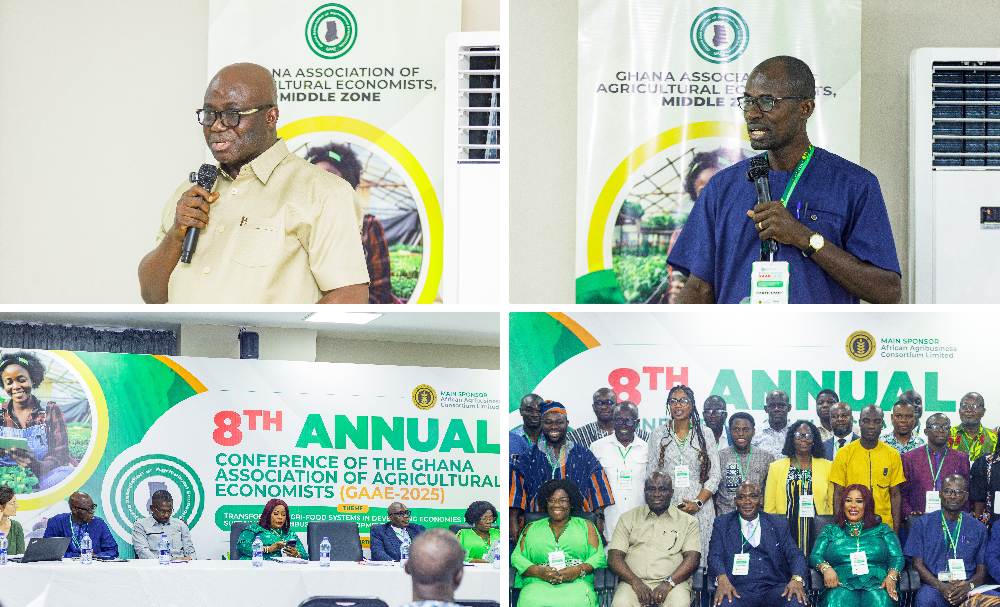The Kwame Nkrumah University of Science and Technology (KNUST), Kumasi, has hosted the 8th Ghana Association of Agricultural Economists (GAAE) Annual Conference on agri-food systems in developing countries.
The three-day conference, held under the theme “Transforming Agri-Food Systems in Developing Economies through Sustainable Agribusiness Development,” brought together stakeholders from across the agricultural landscape, including academics, researchers, policymakers, and industry players.
The event aimed to promote dialogue, share research findings and innovative practices, and explore sustainable approaches that can drive transformation in agri-food systems in developing economies.
Speaking on behalf of the Vice-Chancellor, Prof. (Mrs) Rita Akosua Dickson, the Dean of the Faculty of Agriculture, Prof. Fred Nimoh, emphasized the need for a system-wide transformation to tackle persistent challenges in the agricultural sector. He said such transformation must be inclusive, resilient, and sustainable, consciously integrating science, business, and policy in a mutually reinforcing manner.
He noted that universities have a pivotal role to play in driving this change. “The transformation of agri-food systems will depend heavily on the kind of research, teaching, and community engagement we pursue,” he said.
“Our universities must move beyond theory to become living laboratories for agribusiness innovation, linking classrooms with farms and research with enterprise. Through incubation hubs, university farms, and partnerships with agribusinesses, we can nurture a new generation of young people who view agriculture as a profitable and noble venture.”
Prof. Nimoh further stressed that transforming agri-food systems requires active collaboration among government agencies, academia, the private sector, and local communities.
Prof. John K. M. Kuwornu, President of the Ghana Association of Agricultural Economists (GAAE), said the Association remains convinced that agri-food transformation cannot be achieved without the proper integration of the various components of sustainable agribusiness, including financing, production, processing, logistics, distribution, and marketing.
He noted that the conference serves as a vital platform for presenting and discussing cross-cutting studies, promoting policy dialogue, and advancing evidence-based decision-making to enhance resilient agri-food systems.
Minister for Food and Agriculture, Eric Opoku, emphasized the critical role of agricultural economists in shaping Ghana’s food systems transformation.
He said their expertise provides the analytical foundation for designing sound policies, market-based incentives, and investment decisions that accurately assess the cost of food production and create opportunities without excluding smallholders.
He cautioned, however, that growth must not come at the expense of sustainability. “Climate change continues to threaten our livelihoods through erratic rainfall, floods, and rising temperatures that negatively impact agriculture and its allied businesses. The choices we make today will shape the food systems of tomorrow, systems that feed our people, create jobs, and sustain our planet,” he said
Dr. (Mrs) Adelaide Araba Siaw Agyapong, Chief Executive Officer of the African Agribusiness Consortium, called for stronger alignment between research and practice to achieve meaningful outcomes for farmers and agribusinesses.
She observed that limited funding, inconsistent policies, and fragile institutions often hinder long-term progress in agricultural projects.
“We usually begin initiatives within two years but struggle to scale from pilot to national levels due to insufficient support. The problem is not the lack of ideas; it is that our structures do not support long-term, coordinated action,” she noted.
A presentation was also made by Fabienne Yver, Technical Advisor on the Sustainable Cocoa Initiative, on sustainability issues in the cocoa sector focusing on how sustainability can be achieved and the roles different actors can play in sustaining the sector.

















